Related Research Articles
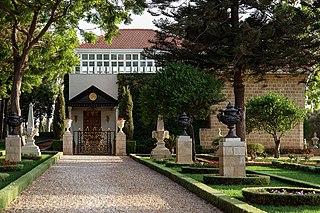
The Baháʼí Faith is a monotheistic religion founded in the 19th century that teaches the essential worth of all religions and the unity of all people. Established by Baháʼu'lláh, it initially developed in Iran and parts of the Middle East, where it has faced ongoing persecution since its inception. The religion is estimated to have approximately 8 million adherents as of 2020, spread throughout most of the world's countries and territories.
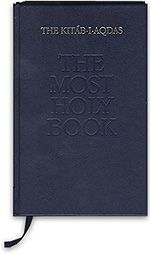
The Kitáb-i-Aqdas is the central religious text of the Baháʼí Faith, written by Baháʼu'lláh, the founder of the religion, in 1873. Though it is the main source of Baháʼí laws and practices, much of the content deals with other matters, like foundational principles of the religion, the establishment of Baháʼí institutions, mysticism, ethics, social principles, and prophecies. In Baháʼí literature it is described as "the Mother-Book" of the Baháʼí teachings, and the "Charter of the future world civilization".

In religion and theology, revelation is the disclosing of some form of truth or knowledge through communication with a deity (god) or other supernatural entity or entities.
Dispensationalism is a theological framework for interpreting the Bible which maintains that history is divided into multiple ages called "dispensations" in which God interacts with his chosen people in different ways. It is often distinguished from covenant theology. These are two competing frameworks of Biblical theology that attempt to explain overall continuity in the Bible. Coining of the term "dispensationalism" has been attributed to Philip Mauro, a critic of the system's teachings, in his 1928 book The Gospel of the Kingdom.
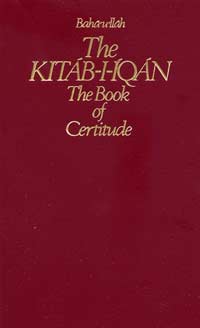
The Kitáb-i-Íqán is a book written by Baháʼu'lláh, the founder of the Baháʼí Faith. It is the religion's primary theological work and one of many texts that Baháʼís hold sacred. It is considered the second most important book in the Baháʼí writings, with the most important being the Kitáb-i-Aqdas. One Baháʼí scholar states that it can be regarded as the "most influential Quran commentary in Persian outside the Muslim world," because of its international audience.

The Hidden Words is a book written by Baháʼu'lláh, the founder of the Baháʼí Faith, around 1858. He composed it while walking along the banks of the Tigris river during his exile in Baghdad. The book is written partly in Arabic and partly in Persian.
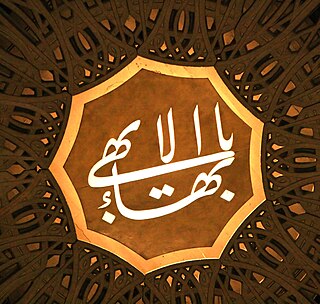
In the Baháʼí Faith there are two covenants, deemed the 'greater' and 'lesser'. The greater covenant refers to an agreement of progressive revelation: that God will send messengers about every thousand years, and it is humanity's duty to recognize them and respond to their teachings. The lesser covenant is the agreement between the faith's founder, Baháʼu'lláh, and his followers, regarding the succession of leadership and the maintenance of unity.
Progressive revelation is a core teaching in the Baháʼí Faith that suggests that religious truth is revealed by God progressively and cyclically over time through a series of divine Messengers, and that the teachings are tailored to suit the needs of the time and place of their appearance. Thus, the Baháʼí teachings recognize the divine origin of several world religions as different stages in the history of one religion, while believing that the revelation of Baháʼu'lláh is the most recent, and therefore the most relevant to modern society.
The Manifestation of God is a concept in the Baháʼí Faith that refers to what are commonly called prophets. The Manifestations of God are appearances of the Divine Spirit or Holy Spirit in a series of personages, and as such, they perfectly reflect the attributes of the divine into the human world for the progress and advancement of human morals and civilization through the agency of that same Spirit.
The Baháʼí teachings, which are incorporated in the Baháʼí writings. cover theological, ethical, social, and spiritual concepts which were established by Baháʼu'lláh, founder of the Baháʼí Faith, and elucidated at his passing by his son, ʻAbdu'l-Bahá, following whom, ‘Abdu’l-Bahá’s grandson, Shoghi Effendi. A core teaching of the Baháʼí Faith is the fundamental unity of the world's major religions as part of a single plan overseen by one God. The teachings also address theological subjects including the oneness of God, humanity and religion, as well as aspects of human life such as the harmony of science and religion, elimination of extreme wealth and poverty, universal compulsory education, and the equality of all people equality, regardless of gender, race, nationality, colour, or social class.

Gems of Divine Mysteries is a lengthy Arabic epistle by Baháʼu'lláh, the founder of the Baháʼí Faith. The tablet was written during his time in Baghdad (1853-1863) in Arabic, and was published in English in 2002.
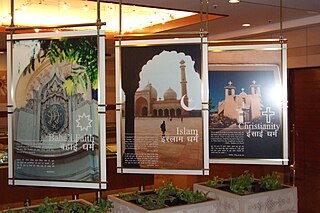
Unity of religion is a core teaching of the Baháʼí Faith which states that there is a fundamental unity in many of the world's religions. The principle states that the teachings of the major religions are part of a single plan directed from the same God. It is one of the core teachings of the Baháʼí Faith, alongside the unity of God, and the unity of humanity.
Baháʼí literature covers a variety of topics and forms, including scripture and inspiration, interpretation, history and biography, introduction and study materials, and apologia. Sometimes considerable overlap between these forms can be observed in a particular text.
Gleanings from the Writings of Baháʼu'lláh is a compilation of selected tablets and extracts from tablets by Baháʼu'lláh, the founder of the Baháʼí Faith. Shoghi Effendi, Guardian of the Baháʼí Faith from 1921 to 1957, made the selection and performed the translation, which was first published in 1935.
The writings of Baháʼu'lláh are the corpus of texts written or narrated by Baháʼu'lláh, which are regarded as sacred scripture in the Baháʼí Faith. Baháʼu'lláh was the founder of the Baháʼí Faith; he was born in Persia and later exiled for being a follower of the Báb, who in 1844 had declared himself to be a Manifestation of God and forerunner of "Him Whom God shall make manifest". Bahá’ú’lláh first announced his claim to be a Manifestation of God in 1863 and spent the rest of his life as a prisoner of the Ottoman Empire, exiled first to Baghdad, followed by Istanbul, Edirne, where he began proclaiming his mission, and finally Acre. His teachings revolve around the principles of unity and religious renewal, ranging from moral and spiritual progress to world governance.
Continuous revelation or continuing revelation is a theological belief or position that God continues to reveal divine principles or commandments to humanity.

Baháʼu'lláh was an Iranian religious leader who founded the Baháʼí Faith. He was born to an aristocratic family in Iran and was exiled due to his adherence to the messianic Bábi Faith. In 1863, in Iraq, he first announced his claim to a revelation from God and spent the rest of his life in further imprisonment in the Ottoman Empire. His teachings revolved around the principles of unity and religious renewal, ranging from moral and spiritual progress to world governance.
The following outline is provided as an overview of and topical guide to the Baháʼí Faith.
The Kitáb-i-Badíʻ is a book composed by Baháʼu'lláh, the founder of the Baháʼí Faith, in 1867-68 in Adrianople. Twice the size of the Kitáb-i-Íqán, it contains insights into the prophecies of the Báb concerning 'Him Whom God shall make manifest' and was written in defence of the Baháʼí Revelation. The work has not yet been translated into English.
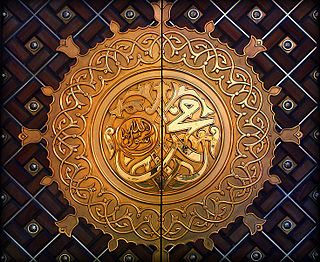
Baháʼís venerate Muhammad as one of a number of prophets or "Manifestations of God", but consider his teachings to have been superseded by those of Baháʼu'lláh, the founder of the Baháʼí Faith.
References
- ↑ "The Bahá'í View of Islam". studycircle. Archived from the original on 2008-03-12.
{{cite web}}: CS1 maint: unfit URL (link) - ↑ The Kitáb-i-Íqán, pg. 199.
- ↑ McMullen, Michael D. (2000). The Baha'i: The Religious Construction of a Global Identity. Atlanta, Georgia: Rutgers University Press. p. 7. ISBN 0-8135-2836-4.
- ↑ The Kitáb-i-Aqdas, gr. 37.
- ↑ "Lesson 2: The Priesthood from Adam to the Restoration", Duties and Blessings of the Priesthood: Basic Manual for Priesthood Holders, Part A, LDS Church, 2000
- ↑ "Dispensations", Bible Dictionary, LDS edition of the Bible, LDS Church
- ↑ Blaising, Craig A.; Darrell L. Bock (1993). Progressive Dispensationalism. Wheaton, IL: BridgePoint. ISBN 1-56476-138-X. p. 116
- ↑ The New Scofield Study Bible, 1984, pg. 3–4